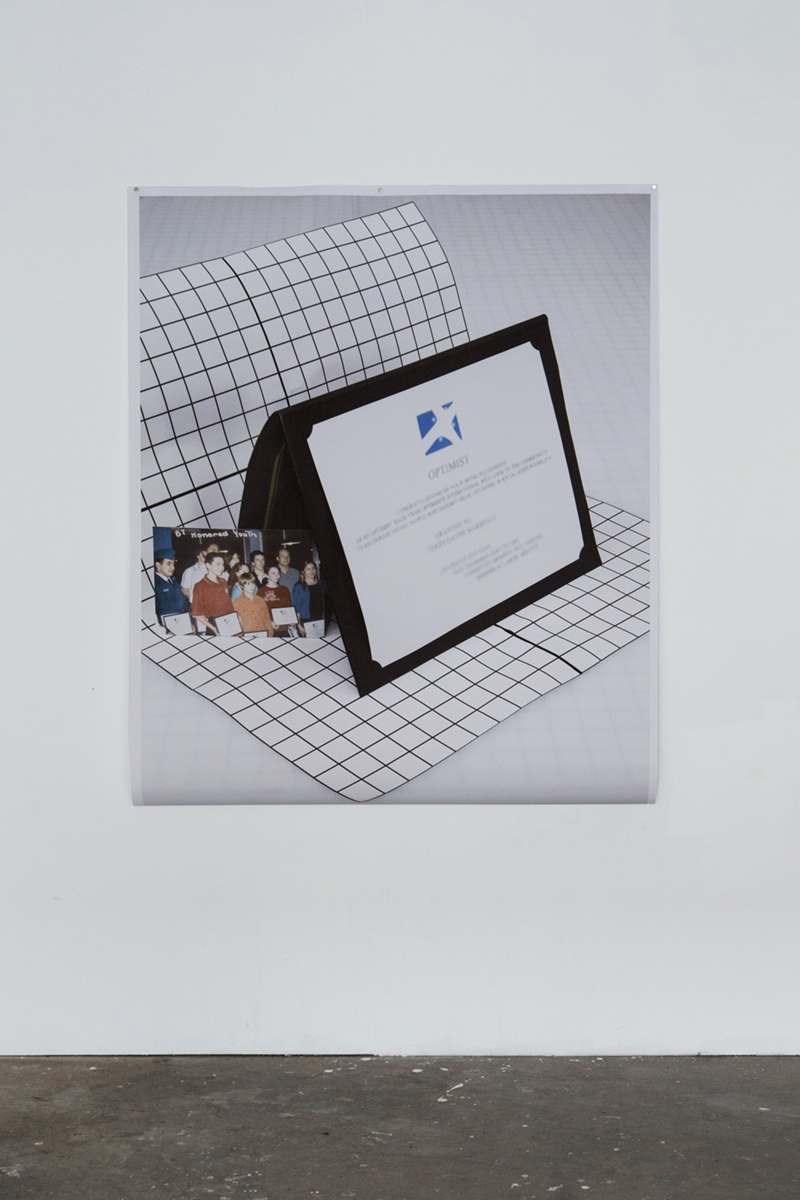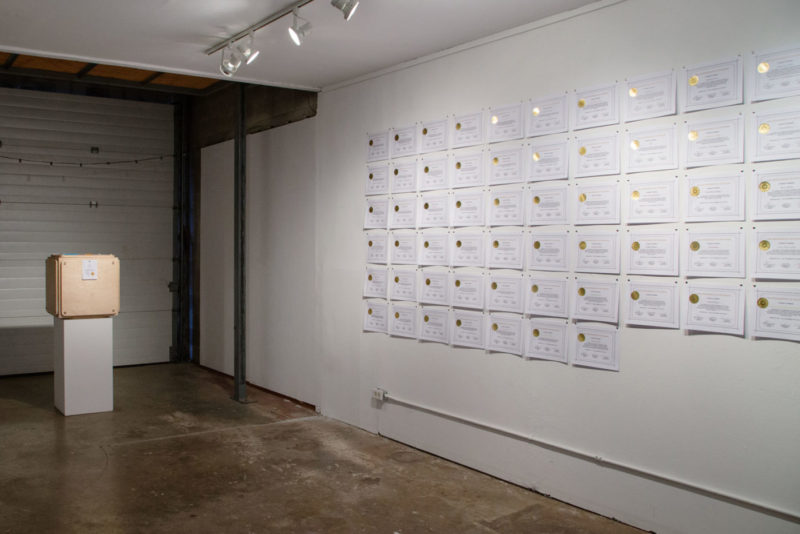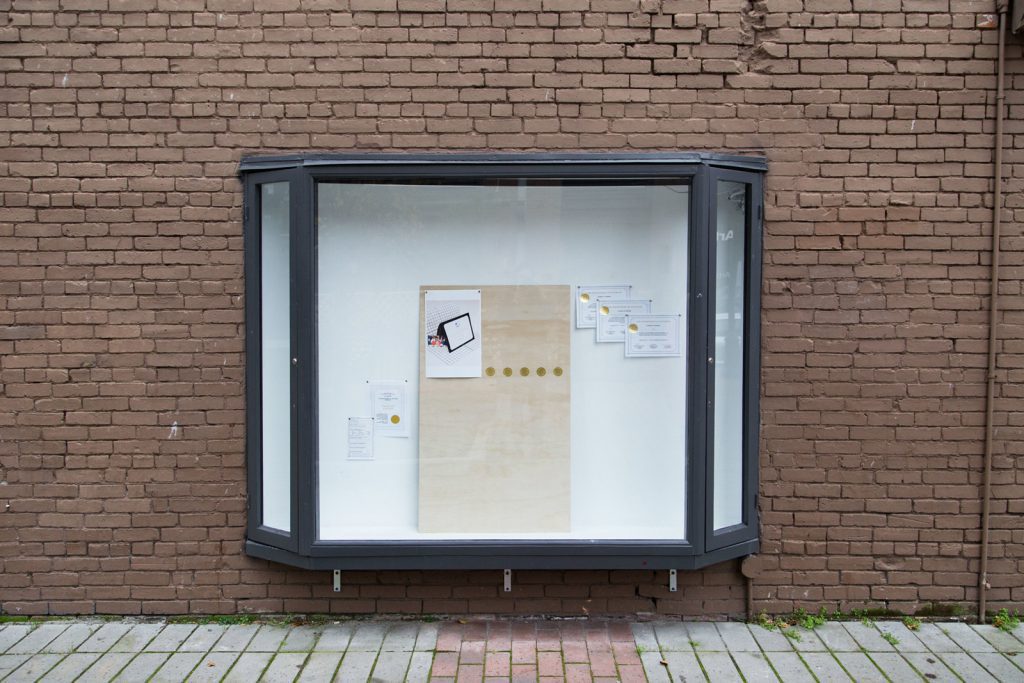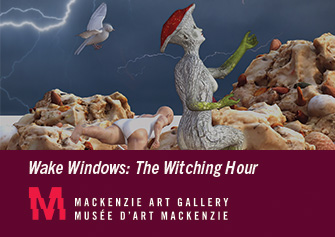A Matter of Connection: Terry-Dayne Beasley’s “Proud to Honour”
10 June 2020
By Ella Adkins
When I moved into my new apartment this past November, I started hanging up the bits of ephemera I’ve collected along the way: a framed, embroidered bouquet of pink flowers, two large nude monochrome prints I made in that one elective at university, and a certificate. It’s printed on thick paper, feeling substantial enough to be of some importance. At the top, in gold text, it reads “The Department of Optimism is Proud to Honour” with my name italicized and underlined, all in red (my favourite colour). It then reads, “In recognition of your helpfulness, selflessness, excitability and meekness. You are a wondrous listener and your soft nature makes all around feel comforted. You’ve been likened to Anna Wintour and Jackie Kennedy. You are graceful.” The certificate is officiated with a gold sticker, embossed with the text, “DEPARTMENT OF OPTIMISM”. There’s a space at the bottom of the document stating who nominated me. It’s anonymous, although there is only one person who would liken me to Jackie Kennedy. I think about them, and the complexities and history of our relationship. I find it strange that they’ve also likened me to Anna Wintour, unsure to feel insulted or complimented, but overall, it’s amusing. After sharing this tender moment with the piece of paper in my hands, I then put it up on the wall next to my degree, and chuckle at their similarity in appearance.
This certificate is a product of Vancouver artist Terry-Dayne Beasley’s most recent “public service” work. The exhibition titled Proud to Honour, set up and facilitated an award giving service, wherein participants nominated a person of their choosing—whether it be a family member, close friend or distant-yet-memorable acquaintance—for their outstanding character traits. The work was presented and displayed in December 2018 at artist run centre the Ministry of Casual Living in Victoria, B.C., and was produced in collaboration with Vancouver-based Number 3 Gallery.
Proud to Honour was initially prompted by Beasley’s own experiences of being recognized in his lifetime. He recalls being nominated at age eleven by his principal for a “Certificate of Optimism” from Optimists International, a volunteer organization that awards nominees and recognizes individuals across the world for their acts of leadership and optimism. “I was thinking about the exclusivity of that act, nominating someone for their character traits, which then got me on to the idea: What if a democratic accessible public service existed for people to be recognized for the traits that others see as spectacular, noble or glossed over?” The logistics of the project are simple: Beasley and Number 3 Gallery created an online survey, which was accessible through their social media platforms and on the gallery’s website. Anyone and everyone with access to the Internet and a computer was able to participate in the project. The survey consisted of various carefully crafted questions about the person who was being nominated, such as their favourite colour, famous individuals that remind you of that person, etc. The nominators were then required to select from a predetermined list of personality traits to describe their temperament. Upon completing the survey to nominate my mom, I noticed the diverse, yet surprising traits on the list: “Which adjectives would best describe the recipient: selfless, feisty, helpful, generous, honest, vivacious, selfish, excitable, meek.”
“Selecting the traits was a collaborative process, between myself and the curators at Number 3 Gallery” says Beasley. “We decided that having certain traits that were kind of confusing, and not immediately seen as flatter[ing] would spark the memory of traits that the nominated individual might not have considered positive when recognized for those things”.
I too experienced this sort of ‘reclaiming’ of an assumed negative trait during the process of being nominated. One of the traits I was nominated for was my ‘meekness’. I instantly felt a pang in my gut when I saw that word, which has always elicited a cocktail of embarrassment and shame for me. However, in the context of receiving this award, I was able to reclaim the trait as something positive. I started to think about the descriptor as something to be honoured in myself, rather than something I always had to fight against. My meekness allows me to be an observer, a listener, and a sponge for all the happenings around me. It allows me to be hyper-reflective, and probably acts as gasoline for my creative writing practice. In that moment, I realized the very emotional effect of this project.

Beasley’s work makes me think about how we often aren’t formally recognized for our intrinsic and personal value as individuals. Societally, we are in the height of late-stage capitalism, where human bodies and energies are overworked, over-exerted and over-stimulated. After arriving home after a very full and productive day, I sometimes find a discomfort with not immediately doing anything, even if that thing is as unproductive as consuming my Instagram feed. It feels expected and perpetuated by those around us to uphold a very high, arguably, impossible level of functionality: holding three part-time jobs while completing a bachelor’s degree, upkeeping two or more social media accounts, sustaining and barely affording a recreational drug habit, self-producing an album, and all the while still managing to pay Vancouver rent.
Recently, I have taken a break from my three-job hustle, to focus on my writing, myself and my relationships, and I was surprised at how high my sense of personal validation was for that draining and unsustainable life. Paradoxically, in this decision to better my life through simplifying things, I began to feel emotionally worse than I ever had. I was experiencing a case of self-described ‘millennial madness’: moving from my previous anxiety surrounding my overloaded lifestyle, to a reinvented anxiety surrounding the fact that I don’t have a thousand and one things to do. Evidently, my value system was based on what I did rather than who I am as an individual. It was then that I returned to look at the certificate on my wall. Experiencing and participating in Beasley’s work asks me to meditate on the question: Why is it that we don’t consider gestures of kindness, grace and patience as traits formally worth recognizing?
There’s a democratic and inclusive aspect of this work that manifests itself in many layers. The relationship between the two organizations and cities becomes an important layer within this piece. “I immediately saw a potential in this inherent bureaucratic and political relationship between Vancouver and Victoria. I wanted to incorporate this act of riding away to Victoria to partake in democracy within the work.” So, instead of explicitly challenging and rejecting the exclusivity of award and recognition ceremonies (and their institutionalized settings), Beasley attempted to re-work the structure by creating an inclusive institution that honours people in a more democratic sense. “I came to the idea of founding—under the Ministry of Casual Living—a Department of Optimism, a fictional department which recognizes people’s traits under the guise of the institution.” Beasley’s critique of this kind of inaccessibility defies the usual standards of such systems by making formal recognition more personal and fluid.

“One of the questions that I got the most feedback on was the favourite colour. We included it in the survey since it is such a token question, and something you remember about someone you are close to. But many people didn’t know the answer to this question which stopped them from doing the certificate altogether”. In this instance, the work starts to fulfill another function: confronting and revealing the presumed depth of our relationships. While relationships run deeper than knowing someone’s favourite colour, this feedback from participants poses the question: how deep are our connections and do we prioritize creating meaningful connections with others in our lives?
After receiving close to one hundred nominations, Beasley and Number 3 were then tasked with processing the data and distributing the certificates to the nominees. “Interpreting the data was a lovely portion of the project” beams Beasley. “It was like facilitating seventy five thank you cards to people I’ve never met.” While Beasley was merely a facilitator of the process, he also indirectly benefited from the positive exchange. Relinquishing his control as the artist allowed Beasley to observe connection and appreciation under the structure he created. “I hope to have created a space for people to engage, and that is how the work produces. Without the public’s engagement, the work wouldn’t exist.” Once the certificates were produced, they were carried to Victoria, to be displayed at the Ministry of Casual Living for the duration of the exhibition, and mailed to the nominees afterward.
Beasley’s work is, to put it simply, refreshing—to have an award system that isn’t based on social or economic collateral, but rather exists as a very simple appreciation platform. “I strived to eliminate any qualifiers, and provide an opportunity for someone to be recognized for what makes them subjectively unique,” says Beasley. While there will always be hoops to jump through for certain individuals, I would argue that Beasley attempts to create as democratic a system for recognition as he could, since an individual with no previous exposure to contemporary art practices can look at, understand and participate in this work. Beasley chimes, “It is so easy for art to become exclusive, which affects the degree in which people engage. This is a multi-layered simple work: there is more depth there if you choose to look for it.” If anything, the work begs us to take a pause from our millennial madness to meditate on appreciating one another for our intrinsic human offering to this world, regardless of social clout or notability.
Proud to Honour ran from December 7 – 21, 2018 in the main and Window Galleries at the Ministry of Casual Living in Victoria, B.C. and was curated by Number 3 Gallery.
Feature Image: Installation view of Proud to Honour at the Ministry of Casual Living’s Window Gallery. Photo courtesy of Number 3 Gallery.



